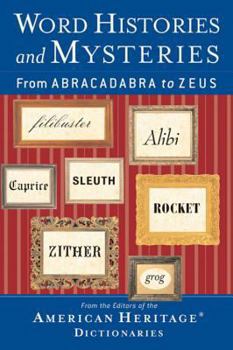Word Histories and Mysteries: From Abracadabra to Zeus
Select Format
Select Condition 
Book Overview
Did you know that cats are related etymologically to caterpillars? Or that Thomas Edison played a key role in popularizing the use of the greeting "Hello"? Or that muscles were originally mice, since a flexed biceps looks like a little rodent scurrying under the skin? Word Histories and Mysteries provides a panoramic view of the unique richness of English, uncovering the origins of five hundred everyday words whose surprising and often amusing stories offer insights into the history of humankind. Arranged in convenient alphabetical order, the notes are written in a lively and entertaining style perfect for browsing. The reader can learn how some of the most recent words, such as the computer term wiki, were coined, or trace the origins of English back to the Indo-European language spoken long before the invention of writing. A short introduction outlines the techniques linguists use to trace the history of words, and a handy glossary explains the linguistic terms that describe the ways in which language changes over time. Photographs and drawings help familiarize the reader with the ancient objects or cultural practices from which our words have sprung. Fascinating and fun to read, Word Histories and Mysteries is an ideal gift for high school or college students interested in language and for anyone who wants to know more about the curious sounds we make to communicate every day.
Format:Paperback
Language:English
ISBN:0618454500
ISBN13:9780618454501
Release Date:October 2004
Publisher:Collins Reference
Length:348 Pages
Weight:0.94 lbs.
Dimensions:0.9" x 5.5" x 8.6"
Customer Reviews
2 ratings
I would like to say that it's a little bit dissapointing
Published by Thriftbooks.com User , 20 years ago
This paperback compendium of articles on the origins of words has been compiled by the editors of the American Heritage Dictionaries. Among the oddities revealed by its writers are that average derives from an Old French word meaning "damage to shipping", that caprice comes by a devious route from an old Italian word for a hedgehog, that in medieval times deer was the name for any creature, that in Middle English dinner could mean breakfast, that fawn and fetus are etymologically connected, that garage is from a French word whose first sense in that language was a place where one moors one's boat, that junk originally meant old rope ... and so on. Its writers have not shied away from discussing features of some of the most common words, such as a, it and they. You will also be painlessly introduced to some of the terminology and ideas of etymology, such as back-formation (a word mistakenly formed from another by removing what looks like an ending), folk etymology (popular legends about word origins), metanalysis (a shift in the division between words, as a napron became an apron, metathesis (in which sounds are transposed inside a word, as wops turned into wasp), and melioration (in which over time a word becomes more elevated or positive in meaning). Though not all these terms are explained in the text, there is a glossary at the end of the book.
A very fine linquistic survey
Published by Thriftbooks.com User , 20 years ago
How do new words enter the English language and dictionaries - and where did some older oddities come from? Plenty of 'word origin' titles are published; the Editors of the American Heritage Dictionaries answer numerous questions about what influences word changes and popularity, providing the stories of over 400 words from all areas of the vocabulary. Word Histories And Mysteries: From Abracadabra To Zeus is a very fine linquistic survey which is especially recommended for 'word origin' fans.






